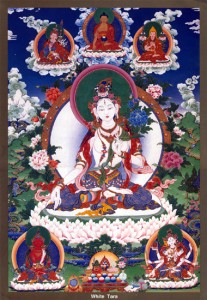![buddha5ascetics28[1]](https://www.tibetanbuddhistaltar.org/wp-content/uploads/2010/09/buddha5ascetics281-234x300.jpg)
An excerpt from a the teaching, When the Teacher Calls, by Jetsunma Ahkon Lhamo
In Buddhist tradition and particularly in Vajrayana Buddhism, there is a kind of practice called devotional practice. One of its most meaningful and foundational aspects is developing a relationship of pure devotion with one’s lama or teacher. In Vajrayana, the teacher is considered to be the door to liberation because even though the Buddha was once on the earth and even though the Buddha’s teachings are written in books, it is just about impossible to enter onto the Path without the blessings of the teacher. The lama, who is necessary for empowerment, transmission and teaching, is considered to be the blessing that is inherent in the Path.
In the Vajrayana tradition there is a devotional aspect to every practice that is done,from the most preliminary to the most superior practice, and it is considered to be the means by which blessing is actually transmitted. In the Nam Chö Ngöndro, the preliminary practice accomplished at this temple, there is a beautiful song of invoking the lama’s blessing called “Calling the Lama from Afar.” It has haunting melody, and it is done from one’s heart in order to soften the ego and make the mind like a bowl ready to receive any blessing.
This type of practice functions like a cultivator. Think of planting a field of grain. One has to plow the field and work the soil so that it’s capable of receiving the seed. Otherwise, if the soil were not ready, when seed was thrown out it would just bounce, as on a hard surface. Likewise, devotional practice is considered to make one ready. Its benefit is immeasurable. Without it there is no possibility of the blessing being fully received.
Devotional yoga is meant to benefit the student. The teacher is not “pleased” by devotional yoga. Rather, the teacher is pleased by movement and the softening, the gentling and the change that occurs within the student. In the same way as the student calls the lama from afar in traditional practice by putting one’s heart in a position of surrender, we may talk about what the lama experiences when the lama calls the student from afar and the student responds to that call.
When a student calls the teacher, with his or her mind and heart like a bowl, many things are happening. First, there is fantastic auspicious karma ripening. In order for a student even to make that step, he or she must have accumulated a tremendous amount of merit or virtue in the past. A nonvirtuous mind cannot call the teacher with devotion.
When the student calls the lama, it’s because the student has realized certain things. First of all, they have looked around and have seen that cyclic existence or ordinary life is flawed or faulted. Sometimes it’s older students who, in some ways, are able to do this more readily because they’ve seen their lives pass, and they have looked around and said, “What have I done? I’ve worked so hard my entire life, and what have I really accomplished? What am I going to take with me?”
At any rate, the student that is prepared to call the teacher has been awakened, stimulated, has understood that much time has passed and that very little can be really accounted for. There has been some fun. It’s been up and down. We’ve all experienced getting older; we’ve all experienced sickness, and we will certainly experience death. At some point we look at all of this and ask ourselves, “Isn’t there something more? There must be something!” We begin to think in this way, and then we see someone who can give us a path, not just thoughts about the path, not just ideas that are popular in the New Age, but a technology that is succinct and exacting, a method that has shown itself to give repeatable results. When students see this they become hopeful and joyous. Suddenly they’re excited, and they begin to want to come in closer to this experience. It’s a beautiful, precious moment, but that moment can only happen due to the virtue of the student’s previous practice.
Eventually students will come to the point, due to the virtue of their practice, where they will do anything because they know their time is short. They know that they’ve tried everything and nothing has worked. Nothing has produced permanent happiness, so they are looking at the door to liberation, and in part, that is how the teacher is considered. They want to walk through that door.
© Jetsunma Ahkon Lhamo
![buddha5ascetics28[1]](https://www.tibetanbuddhistaltar.org/wp-content/uploads/2010/09/buddha5ascetics281-234x300.jpg)





